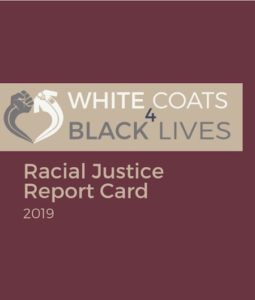 The organization White Coasts for Black Lives is a medical student-run organization formed to dismantle racism in medicine and promote the health, well-being, and self-determination of people of color. Its three main goals are to:
The organization White Coasts for Black Lives is a medical student-run organization formed to dismantle racism in medicine and promote the health, well-being, and self-determination of people of color. Its three main goals are to:
* Foster dialogue on racism as a public health concern.
* End racial discrimination in medical care.
* Prepare future physicians to be advocates for racial justice.
The organization recently released its Racial Justice Report Card which rates 17 major medical schools on 14 metrics that evaluate each institution’s curriculum and climate, student and faculty diversity, policing, racial integration of clinical care sites, treatment of workers, and research protocols.
None of the 17 evaluated medical schools had underrepresented minority medical student and faculty representation proportional to the American population. The report found that 15 out of the 17 schools had either no public information on racial disparities in medical student evaluation or were reported to have racial disparities in grading and award systems with no plans for mitigation. The vast majority of these academic medical centers have no public policy of paying all employees a living wage and providing comprehensive health insurance accepted at the academic medical center.
On the positive side, every evaluated school had at least some system in place to recruit underrepresented students and had a mechanism to report racist or biased incidents, The report found that 14 out of the 17 schools have at least a rudimentary curriculum on the history of racism in medicine.
The full report may be downloaded by clicking here.













As an African American physician who has graduated from the Albert Einstein College of Medicine, completed residency at College of Physicians and Surgeons of Columbia University and fellowship at Strong Memorial Hospital of the University of Rochester, I can say without doubt that racial discrimination is actively performed against minority doctors in these institutions and certainly all others. I remember being ritualistically humiliated, insulted and my intelligence disparaged at nearly every turn. Whatever the quality of training they provide to Black physicians under their administration will leave these places with unseen psychological scars that may take years to heal if ever. That such ill treatment to their colleagues is commonplace and accepted raises in this writer serious questions regarding the ethics and morality of medical establishment, the universities they inhabit and the care provided to minority patients within them.